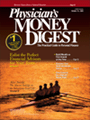Direct Every Arena of Your Tax Burden
It's that time of year again, when weary taxpayersgather their papers and spreadsheets and takeon this year's income tax challenge. There arefactors physicians should know about that affecttheir tax burden as an individual, business owner, andinvestor. Let's take a look at them.
Efficient Management
Physician-employers can avoid heavy payroll taxationby shifting a portion of employees' compensationsfrom salaries to fringe benefits (eg, unreimbursedmedical expenses and payroll deduction groupinsurance). Benefits can be included in a Section 125cafeteria plan; both employer and employee receive abenefit from that. Set up a cafeteria plan that allowsemployees to pay for dependent care expenses. Thiswill likely save them more than a childcare credit.
If you need to purchase equipment, do so beforethe end of the year. This enables you to take advantageof 2004's higher business purchase deductionsunder Section 179. The Section 179 deduction forsmall business expensing of new equipment increasedfrom $25,000 to $100,000 for 2003 to 2005. Be sureto time purchases properly. Make sure that businesspurchases of personal property are spread throughoutthe year; otherwise, you won't maximize the company'sdepreciation deduction. If you acquire 40% ormore of your assets in the fourth quarter of the year,the midquarter convention applies, which limitsdepreciation for the year.
Look at health insurance premiums if you employyour spouse. Self-employed taxpayers who providework for their spouses may deduct 100% of the healthinsurance premiums for their spouse and dependents.
Conduct a cost segregation study to identify andprice separately the nonstructural items and landimprovements from your building to accelerate depreciation.When these items are properly identified theycan generate immediate tax savings by acceleratingdepreciation deductions and deferring taxes.
Personal Tax Savings
In looking out for your personal taxes, first andforemost, participate in all available employer-sponsoredretirement vehicles (whether or not you're theemployer). Take maximum advantage of your company'sflexible spending account or cafeteria plan,401(k) plan, and medical savings account. In 2004,you can invest up to $13,000 in 401(k)s. If you'reover age 49, the amount increases to $16,000.
Donation note:
Make charitable donations of appreciated securities.You may want to consider contributing appreciatedsecurities to your favorite charity. The amount of your deduction is the value, not thecost, of the property.
To avoid nondeductible interest payments, pay offpersonal debt or replace it with a home equity loan.Home equity loan interest is fully tax-deductible up to$100,000. On the other hand, consider charging somedeductible purchases, such as contributions, medicalexpenses, business expenses, and some state tax payments,if you need the deductions this year but don'thave ready cash to cover costs.
Caution:
Try to pay state and local taxes or your Januarymortgage before Dec. 31 to increase federal deductionsthis year. This is not advantageous ifthe alternative minimum tax applies in your situation.You may, alternatively, decide to defer taxes,shifting income into next year and acceleratingdeductions when possible and helpful. This deferspaying the tax for a year.
Constructive Pointers
Finally, the following are a few useful tax tips forphysician-investors:
• Delay late-year mutual fund investments. If youwait until after the fund's dividend date, you don'thave to pay tax on the dividend.
• Save every statement you receive. This will allowyou to calculate exact equity gains or losses.
• Count reinvested dividends as part of your taxbasis when you sell stock to avoid being taxed twice.
The key:
Physicians still have quite a few opportunities tolower their tax loads, as long as they are proactive.Work with your accountant to make sure you're takingadvantage of as many savings as possible. Have this discussion before you dump all your incometax data on your accountant's desk on April 14.
is a partner and head of the tax
department at Filomeno & Company, PC, a certified
accounting and business advisory firm
located in West Hartford, Conn. For over 35
years, the firm has been advising business owners
on financial matters as partners in helping
them grow their businesses and maintain and
increase their wealth. Visit www.filomeno.com and check "Helpful
Tax Information" for more tax tips. Mr. Cioffari welcomes questions
or comments at pdc@filomeno.com.
Paul Cioffari
